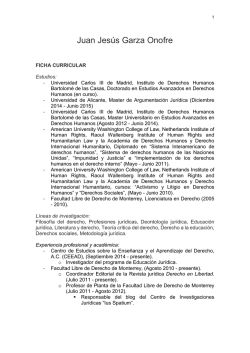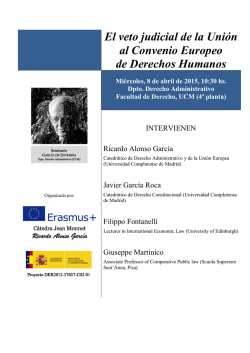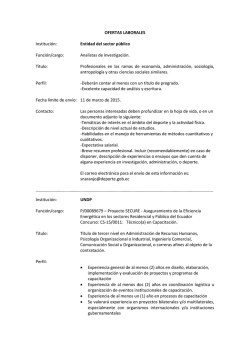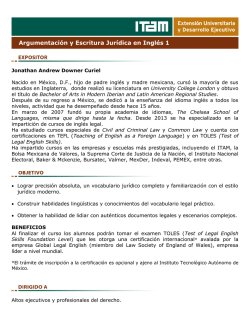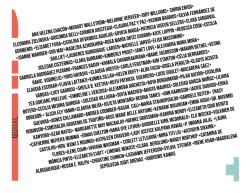
Human Rights Experts Urge President Peña Nieto to Support
President Enrique Peña Nieto
Office of the President
Official Los Pinos Residence
The Republic of Mexico
Your Excellency,
We write to express our deep concern regarding the continued enforced disappearance of 43
students from the Raúl Isidro Burgos Normal Rural School of Ayotzinapa, and urge your
government to expend maximum effort and commitment to determine their whereabouts and
provide truth and justice for the victims, their families, and the Mexican people in this atrocious
case.
We commend the recently released report of the Interdisciplinary Group of Independent
Experts (GIEI), appointed by the Inter-American Commission on Human Rights (IACHR) in
agreement with the students’ families and your government to look into the Ayotzinapa case.
We also welcome your government’s consent to extend the group’s mandate. We support the
families’ call for the mandate to be extended for as long as necessary, keeping in mind that the
government’s obligation is to clarify what happened to the disappeared students and to
discover where they are, a task for which the continued participation of the GIEI is crucial.
As you know from the report presented to your government, the GIEI uncovered troubling
instances of multiple investigative errors, including mishandled evidence and omitted
testimonies. The group’s findings did not substantiate the federal Attorney General’s Office’s
conclusions about the motive or methods of the crimes; on the contrary, the GIEI concluded
that crucial aspects of the official hypothesis were scientifically impossible. The GIEI found no
compelling evidence to support the government’s main theory that the students were burned
at the Cocula garbage dump. Additionally, the GIEI made it clear that there are further lines of
investigation and other actors whose involvement needs to be fully clarified, including
members of the Mexican army and other federal institutions. Furthermore, the report found
that state and federal police as well as the Mexican army were aware of and present at various
crimes scenes of the brutal, hours-long, and coordinated attack against the students, and yet
did not intercede to protect the lives of their fellow citizens.
We understand that the Attorney General’s Office is analyzing the report to determine how to
incorporate its findings into the government’s investigation. We strongly urge the Attorney
General’s Office to include all aspects of the GIEI’s study, and to implement all of the experts’
recommendations. We especially urge the government to take the following actions:
Continue the search for the students. Based on the available evidence, the GIEI was not
able to ascertain the whereabouts of the students. Until the students are found, the case
should be considered an open investigation into enforced disappearances.
Re-orient the lines of investigation. To begin, a new investigative unit should be
assigned to the case. A review of the motive for the crimes is essential, including examination of
a possible connection with a fifth bus that may have been involved in the transportation of illicit
drugs. Privately-owned and government-owned facilities where the students may have been
brought should be investigated.
Allow the GIEI to interview all authorities. Testimony is needed immediately from all
authorities who were present during the incidents – including the Mexican army and federal
police. For example, the group must be permitted to interview in person members of the 27th
Infantry Battalion of the Mexican army, who may have played a role in the events that night.
Guarantee quality attention to the victims. Implement the agreed-upon legal, social,
psychological, and medical aid to the families. Consolidate communication mechanisms with
the families. Strengthen witness-protection mechanisms.
Resolve the issue of enforced disappearances in Mexico. Create a unified national
registry of disappeared persons, integrated with the registry of the National System for
Attention to Victims and standardized information on unidentified remains. Implement
effective, unified protocols for both immediate searches and criminal investigations in all cases
of potential enforced disappearance. The new General Law on Disappearances should
incorporate the input of civil society and victims’ groups.
Over one year after their disappearance, the whereabouts of the students is still unknown,
despite the Attorney General’s Office’s premature declaration that the “historical truth” on the
case had been resolved. Much to the despair of the students’ families, their loved ones are still
not home.
Further, in the investigation and search for the students over the last year, almost 300 other
cases of disappearances in the Iguala area have surfaced. What is more, the government’s
national registry of missing and disappeared persons currently contains over 25,000 cases of
individuals who disappeared between 2007 and July 2015.
While we welcome your meeting with the victims’ families on September 24, we urge you to
increase your government’s efforts on the case. It is imperative that your government exercise
the utmost level of effort, resources, responsibility, care, and commitment to not only find the
43 students from Ayotzinapa, but also to put an end to the crisis of enforced disappearances
and impunity for these crimes in Mexico.
We will continue to monitor the case of the Ayotzinapa students and the reports of widespread
enforced disappearances in Mexico.
We thank you in advance for your attention towards the resolution of this serious matter.
Sincerely,
Walter Albán
Lead Professor, Faculty of Law, Pontifical Catholic University of Peru
Juan Pablo Albán
Director of the Legal Clinic, Professor of International Law and Human Rights, School of Law,
San Francisco University of Quito
Raquel Aldana
Associate Dean, Professor of Law, University of the Pacific, McGeorge School of Law
Philip G. Alston
John Norton Pomeroy Professor of Law, New York University School of Law
Roxanna Altholz
Assistant Clinical Professor, Berkeley Law, University of California
Thomas Antkowiak
Associate Professor of Law; Director, International Human Rights Clinic; Director, Latin America
Program, Seattle University School of Law
Arturo Arias
Tomas Rivera Regents Professor in Latin American Literature, Department of Spanish and
Portuguese, University of Texas at Austin
David Baluarte
Assistant Clinical Professor of Law, Director, Immigrant Rights Clinic, Washington and Lee
University School of Law
Daniel M. Brinks
Co-Director, Bernard and Audre Rapoport Center for Human Rights and Justice, University of
Texas at Austin
Tito Bracamonte
Executive Secretary, National Coordinator for Human Rights in Peru
Laurence Burgorgue-Larsen
Professor of Law, University of Paris Panthéon-Sorbonne
Santiago A. Canton
Executive Director, Partners for Human Rights, Robert F. Kennedy Human Rights
Lauren Carasik, Esq.
Clinical Professor of Law, Director, International Human Rights Clinic, Western New England
University School of Law
Jessica Carvalho Morris
Executive Director, Conectas
Carlos Castresana Fernández
Public Prosecutor of the Supreme Court of Spain (on leave)
Gaston Chillier
Executive Director, Center for Legal and Social Studies (CELS)
Ernesto de la Jara Basombrío
Founding Director, Institute of Legal Defense (IDL), Peru
Connie de la Vega
Professor of Law and Academic Director of International Programs, University of San Francisco
School of Law
Todd Eisenstadt
Professor, Department of Government, American University
Dr. Mark Ellis
Executive Director, International Bar Association
Karen Engle
Co-Director, Bernard and Audre Rapoport Center for Human Rights and Justice, University of
Texas at Austin
Dra. Silvia Figueroa
Professor, Department of Law and International Relations, Monterrey Institute of Technology,
Mexico
Martin Flaherty
Leitner Family Professor of International Human Rights Law Founding Co-Director, Leitner
Center of International Law and Justice, Fordham Law School; Visiting Professor, Woodrow
Wilson School of Public and International Affairs, Princeton University
Alejandro M. Garro
Professor of Law, Columbia Law School, Columbia University
Alejandra Gonza
Director, International Human Rights Clinic, University of Washington School of Law
Dr. Eduardo González Velázquez
Professor-Researcher, School of Humanities and Social Sciences, Monterrey Institute of
Technology, Mexico
Lisa Haugaard
Executive Director, Latin America Working Group (LAWG)
John Heffernan
Executive Director, Speak Truth to Power, Robert F. Kennedy Human Rights
Shin Imai
Associate Professor, Osgoode Hall Law School; Director, Justice and Corporate Accountability
Project, York University
Kerry Kennedy
President, Robert F. Kennedy Human Rights
Viviana Krsticevic
Executive Director, Center for Justice and International Law (CEJIL)
Frank La Rue
Director, Robert F. Kennedy Human Rights – Europe
Karim Lahidji
President, International Federation for Human Rights (FIDH)
Dr. Lucas Lixinski
Senior Lecturer, UNSW Law, University of New South Wales, Australia
David Lovatón Palacios
Lead Professor, Faculty of Law, Pontifical Catholic University of Peru
Helen Mack
President, Myrna Mack Foundation
Annette Martínez-Orabona
Executive Director, Instituto Caribeño de Derechos Humanos (ICADH)
Ruth W. Messinger
President, American Jewish World Service (AJWS)
Jennifer Moore
Member, the National Lawyer’s Committee on Human Rights, Peace Brigades International-USA
Lucia Nader
Fellow, Open Society Foundations (OSF)
Aryeh Neier
President Emeritus, Open Society Foundations (OSF)
Joy Olson
Executive Director, Washington Office on Latin America (WOLA)
John Packer
Director, Human Rights Research and Education Centre, University of Ottawa
Amelia Parker
Executive Director, Peace Brigades International – USA
Francisco J. Rivera Juaristi
Director, International Human Rights Clinic, Assistant Clinical Professor of Law, Santa Clara
University School of Law
César Rodríguez Garavito
Executive Director, Center of Studies on Law, Justice and Society (“DeJusticia”)
Naomi Roht-Arriaza
Distinguished Professor of Law, Hastings College of the Law, University of California
Eric Rosenthal
Executive Director, Disability Rights International (DRI)
Macarena Saez
Faculty Director, Center for Human Rights and Humanitarian Law, American University
Washington College of Law
Katya Salazar
Executive Director, Due Process of Law Foundation (DPLF)
Violeta Sandoval
Director of Training and Social Entrepreneurship, Monterrey Institute of Technology, Mexico
Miguel Sarre
Profesor, Mexican Autonomous Institute of Technology
James Silk
Clinical Professor of Law, Allard K. Lowenstein International Human Rights Clinic
Director, Orville H. Schell, Jr. Center for International Human Rights, Yale Law School
Gwynne Skinner
Director, International Human and Refugee Rights Clinic; Associate Professor of Law,
Willamette University College of Law
Gerald Staberock
Secretary-General, World Organisation Against Torture (OMCT)
David Tolbert
President, International Center for Transitional Justice (ICTJ)
Rodrigo Uprimny Yepes
Researcher and Founding Member, Center of Studies on Law, Justice and Society (“DeJusticia”);
Law Professor, National University of Colombia
José Miguel Vivanco
Director of the Americas Division, Human Rights Watch (HRW)
15 de octubre, 2015
Presidente Enrique Peña Nieto
Oficina de la Presidencia de la República
Residencia Oficial de Los Pinos
Estados Unidos Mexicanos
Distinguido Señor Presidente:
Escribimos la presente para expresar nuestra profunda preocupación sobre la desaparición
forzada de los 43 estudiantes de la Escuela Rural Normal Raúl Isidro Burgos de Ayotzinapa, e
instar a su gobierno a disponer el mayor esfuerzo y compromiso para determinar su paradero y
proporcionar verdad y justicia a las víctimas, sus familiares y al pueblo de México en este atroz
acontecimiento.
Elogiamos el informe recientemente publicado por el Grupo Interdisciplinario de Expertos
Independientes (GIEI), creado por la Comisión Interamericana de Derechos Humanos (CIDH) en
acuerdo con las familias de los estudiantes y su gobierno para investigar el caso de Ayotzinapa.
Asimismo, valoramos positivamente el consentimiento de su gobierno para extender el
mandato del grupo. Apoyamos el llamado de las familias para que el mandato del GIEI se
extienda el tiempo que sea necesario, teniendo en cuenta que la obligación del gobierno es
aclarar lo sucedido a los estudiantes desaparecidos y descubrir dónde se encuentran, una tarea
en la cual la participación e investigación del GIEI resulta crucial.
Como usted sabe por el informe presentado a su gobierno, el GIEI descubrió múltiples y
preocupantes errores en la investigación de los hechos, incluyendo el mal manejo de evidencia
y la omisión de testimonios. Los hallazgos del GIEI no coinciden con las conclusiones de la
Procuraduría General de la República sobre el motivo o los métodos en que se perpetraron los
crímenes; por el contrario, el GIEI determinó que varios aspectos cruciales de la hipótesis oficial
eran científicamente imposibles. El GIEI no encontró ninguna evidencia contundente que
sostuviera la teoría principal del gobierno de que los estudiantes fueron incinerados en el
basurero de Cocula. Además, el GIEI dejó claro que hay otras líneas de investigación y otros
actores cuya participación tienen que ser totalmente aclaradas, incluyendo miembros del
ejército mexicano y otras instituciones federales. Aún más, el informe encontró que tanto
policías estatales y federales, como también miembros del ejército mexicano, tuvieron
conocimiento y estaban presentes en varias escenas del crimen caracterizadas por el brutal uso
de la fuerza, sus largas horas de duración y la coordinación del ataque hacia los estudiantes, sin
interceder para proteger la vida de sus conciudadanos.
Entendemos que la Procuraduría General de la República se encuentra analizando el informe
para determinar cómo incorporar sus hallazgos en la investigación del gobierno. Es por eso que
instamos de la manera más atenta a la Oficina del Procurador General de la República a incluir
todos los aspectos del estudio del GIEI e implementar todas las recomendaciones de los
expertos. Especialmente instamos al gobierno a tomar las siguientes acciones:
Continuar la búsqueda de los estudiantes. Con base en la evidencia disponible, el GIEI
no pudo determinar el paradero de los estudiantes. Mientras que los estudiantes permanezcan
desaparecidos, el caso debe ser considerado como una investigación abierta de desapariciones
forzadas.
Reorientar las líneas de investigación. Para empezar, es necesario que una nueva
unidad de investigación sea asignada al caso. Es fundamental que se realice una revisión del
motivo de los crímenes, incluyendo una posible conexión con un quinto autobús que al parecer
pudo haber estado involucrado en el transporte de drogas ilícitas. Tanto instalaciones privadas
como de gobierno donde los estudiantes pudieron haber sido llevados deben ser investigadas.
Permitir que al GIEI entrevistar a todas las autoridades. Se necesita de manera urgente
el testimonio de todas las autoridades que estuvieron presentes durante los incidentes,
incluyendo el ejército mexicano y la policía federal. Por ejemplo, al GIEI se le debe permitir
entrevistar de forma directa a los miembros del 27vo Batallón de Infantería del Ejército
mexicano, quienes pudieron haber desempeñado un papel de suma relevancia en los
acontecimientos de esa noche.
Garantizar la atención adecuada a las víctimas. Implementar el acuerdo de asistencia
jurídica, social, psicológica y médica a las familias. Consolidar mecanismos de comunicación con
las familias. Fortalecer los mecanismos de protección a los testigos.
Resolver el problema de desapariciones forzadas en México. Crear un registro nacional
de las personas desaparecidas integrado con el registro del Sistema Nacional de Atención a
Víctimas y estandarizar la información sobre los restos mortales no identificados. Implementar
protocolos efectivos y unificados tanto para búsquedas inmediatas como para las
investigaciones penales en todos los casos de posible desaparición forzada. La nueva Ley
General sobre Desapariciones debe incorporar los aportes de la sociedad civil y los grupos de
víctimas.
A más de un año de sus desapariciones, el paradero de los estudiantes sigue sin conocerse,
pese a la declaración prematura de la Procuraduría General de la República de que la "verdad
histórica" sobre el caso ya se había resuelto. Para el inmenso pesar y desesperanza de las
familias de los estudiantes, sus seres queridos aún no regresan a casa.
Cabe mencionar que durante la investigación y búsqueda de los estudiantes en el último año,
casi 300 casos adicionales de desapariciones en la zona de Iguala han salido a la luz. Aún más, el
registro nacional de personas desaparecidas contiene actualmente más de 25.000 casos de
personas que desaparecieron entre 2007 y julio de 2015.
Si bien valoramos la reunión que sostuvo con los familiares de las víctimas el pasado 24 de
septiembre, le urgimos a aumentar los esfuerzos de su gobierno respecto al caso. Es imperativo
que el gobierno despliegue el mayor esfuerzo, recursos, responsabilidad, cuidado y
compromiso, no sólo para encontrar a los 43 estudiantes de Ayotzinapa, sino también para
poner fin a la crisis de las desapariciones forzadas y la impunidad de estos crímenes en México.
Nosotros continuaremos monitoreando el caso de los estudiantes de Ayotzinapa y los informes
que indican el elevado número de desapariciones forzadas en México.
Agradecemos de antemano su atención brindada hacia la resolución de este grave asunto.
Sinceramente,
Walter Albán
Profesor Principal de la Facultad de Derecho de la Pontificia Universidad Católica del Peru PUCP
Juan Pablo Albán
Director del Consultorio Jurídico, Profesor de Derecho Internacional y Derechos Humanos,
Facultad de Derecho, Universidad San Francisco de Quito
Raquel Aldana
Decana Asociada, Profesora de Derecho, Universidad del Pacífico, Escuela de Derecho
McGeorge
Philip G. Alston
Profesor de Derecho ‘John Norton Pomeroy’, Facultad de Derecho de la Universidad de Nueva
York
Roxanna Altholz
Profesora Clínica Asistente, Escuela de Derecho de Berkeley, Universidad de California
Thomas Antkowiak
Profesor Asociado de Derecho; Director, Clínica Internacional de Derechos Humanos; Director,
Programa para América Latina, Facultad de Derecho de la Universidad de Seattle
Arturo Arias
Profesor ‘Tomas Rivera Regent’ en Literatura Latinoamericana, Departamento de Español y
Portugués de la Universidad de Texas en Austin
David Baluarte
Profesor Clínico Asistente de Derecho, Director de la Clínica de Derechos de los Inmigrantes,
Escuela de Derecho de la Universidad de Washington y Lee
Daniel M. Brinks
Co- Director, Centro de Derechos Humanos y Justicia Bernard y Audre Rapoport de la
Universidad de Texas en Austin
Tito Bracamonte
Secretario Ejecutivo, Coordinadora Nacional de Derechos Humanos de Perú
Laurence Burgorgue-Larsen
Profesora de Derecho, Universidad de Paris Panthéon-Sorbonne
Santiago A. Canton
Director Ejecutivo, Partners for Human Rights, Robert F. Kennedy Human Rights
Lauren Carasik, Esq.
Profesora Clínica de Derecho, Directora, Clínica Internacional de Derechos Humanos, Facultad
de Derecho de la Universidad de Western New England
Jessica Carvalho Morris
Directora Ejecutiva, Conectas
Carlos Castresana Fernández
Fiscal del Tribunal Supremo de España (en licencia)
Gaston Chillier
Director Ejecutivo, Centro de Estudios Legales y Sociales (CELS)
Ernesto de la Jara Basombrío
Director Fundador, Instituto de Defensa Legal (IDL), Perú
Connie de la Vega
Profesora de Derecho y Directora Académica de Programas Internacionales de la Universidad
de San Francisco, Escuela de Derecho
Todd Eisenstadt
Profesor, Departamento de Gobierno, American University
Dr. Mark Ellis
Director Ejecutivo, Asociación internacional de Abogados
Karen Engle
Co- Directora, Centro de Derechos Humanos y Justicia Bernard y Audre Rapoport de la
Universidad de Texas en Austin
Dra. Silvia Figueroa
Profesora, Departamento de Derecho y Relaciones Internacionales, Tecnológico de Monterrey,
México
Martin Flaherty
Profesor de Derecho Internacional de los Derechos Humanos ‘Familia Leitner’ y Co- Director
fundador del Centro Leitner de Derecho Internacional y Justicia de la Facultad de Derecho de
Fordham; Profesor invitado de la Escuela Woodrow Wilson de Asuntos Públicos e
Internacionales de la Universidad de Princeton
Alejandro M. Garro
Profesor de Derecho, Facultad de Derecho de Columbia, Universidad de Columbia
Alejandra Gonza
Directora, Clínica Internacional de Derechos Humanos de la Escuela de Derecho de la
Universidad de Washington
Dr. Eduardo González Velázquez
Profesor-Investigador, Escuela de Humanidades y Ciencias Sociales, Tecnológico de Monterrey,
México
Lisa Haugaard
Directora Ejecutiva, Grupo de Trabajo para América Latina
John Heffernan
Director Ejecutivo, Speak Truth to Power, Robert F. Kennedy Human Rights
Shin Imai
Profesor Asociado de la Facultad de Derecho de Osgoode Hall; Director del Proyecto de Justicia
y Responsabilidad Corporativa de la Universidad de York
Kerry Kennedy
Presidenta, Robert F. Kennedy Human Rights
Viviana Krsticevic
Directora Ejecutiva, Centro para la Justicia y el Derecho Internacional (CEJIL)
Frank La Rue
Director, Robert F. Kennedy Human Rights – Europa
Karim Lahidji
Presidente de la Federación Internacional de Derechos Humanos (FIDH)
Dr. Lucas Lixinski
Profesor Titular de Derecho, Universidad de Nueva Gales del Sur, Australia
David Lovatón Palacios
Profesor Titular de la Facultad de Derecho de la Universidad Pontificia Católica del Perú
Helen Mack
Presidente, Fundación Myrna Mack
Annette Martínez-Orabona
Directora Ejecutiva, Instituto Caribeño de Derechos Humanos (ICADH)
Ruth W. Messinger
Presidenta, American Jewish World Service (AJWS)
Jennifer Moore
Miembro del Comité Nacional de Abogados de Derechos Humanos, Brigadas Internacionales de
Paz - EE.UU.
Lucia Nader
Fellow, Open Society Foundations (OSF)
Aryeh Neier
Presidente Emérito, Open Society Foundations (OSF)
Joy Olson
Directora Ejecutiva, Oficina para América Latina en Washington (WOLA)
John Packer
Director, Centro de Investigación y Educación para los Derechos Humanos, Universidad de
Ottawa
Amelia Parker
Directora Ejecutiva de Brigadas Internacionales de Paz - EE.UU
Francisco J. Rivera Juaristi
Director, Clínica Internacional de Derechos Humanos, Profesor Clínico Asistente de Derecho de
la Facultad de Derecho de la Universidad de Santa Clara
César Rodríguez Garavito
Director Ejecutivo, Centro de Estudios de Derecho, Justicia y Sociedad ("DeJusticia")
Naomi Roht-Arriaza
Profesora Distinguida de Derecho, Facultad de Derecho de Hastings, Universidad de California
Eric Rosenthal
Director Ejecutivo, Disability Rights International (DRI)
Macarena Saez
Directora de Facultad, Centro de Derechos Humanos y Derecho Humanitario, Facultad de
derecho de American University
Katya Salazar
Directora Ejecutiva, Fundación para el Debido Proceso Legal
Violeta Sandoval
Directora de Formación y Emprendimiento Social, Tecnológico de Monterrey, México
Miguel Sarre
Profesor, Instituto Tecnológico Autónomo de México (ITAM)
James Silk
Profesor Clínico de Derecho, Clínica Internacional de Derechos Humanos Allard K.Lowenstein.
Director, Centro para los Derechos Humanos Internacionales Orville H. Schell , Jr., Facultad de
Derecho de Yale
Gwynne Skinner
Directora, Clínica Internacional de Derechos Humanos y Refugiados; Profesora Asociada de
Derecho, Facultad de Derecho de la Universidad de Willamette
Gerald Staberock
Secretario General de la Organización Mundial Contra la Tortura (OMCT)
David Tolbert
Presidente, Centro Internacional para la Justicia Transicional
Rodrigo Uprimny Yepes
Investigador y Miembro Fundador, Centro de Estudios de Derecho, Justicia y Sociedad
("DeJusticia"); Profesor de Derecho, Universidad Nacional de Colombia
José Miguel Vivanco
Director de la Division para las Américas, Human Rights Watch (HRW)
© Copyright 2026
